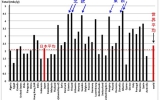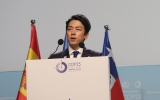G7シャルルボワサミットとエネルギー温暖化問題
6月8-9日のG7シャルルボワサミット(カナダ)では米国の保護主義をめぐって米国とそれ以外のG7諸国との見解が大きく対立した。安倍総理の仲介もありようやく首脳声明をまとめたものの、記者会見において米国の保護貿易措置に対する報復を示唆したカナダトルドー首相の発言に立腹したトランプ大統領が一転、首脳声明の受け入れを拒否するという前代未聞の結末となった。このため日本の新聞報道は通商貿易一色であったが、エネルギー温暖化問題においても米国とそれ以外の懸隔が顕在化している。シャルルボワサミットの首脳声明の関連部分を見てみよう。ちなみにトランプ大統領は米朝会談出席のため、G7サミットを中座し、気候変動に関する議論はトランプ大統領不在の下で行われた。気候変動問題に対するトランプ政権の立ち居地が垣間見え、下記のパラグラフを読んでみるとエネルギー温暖化問題について米国とそれ以外のG7諸国が何を共有でき、何を共有できないかが明確になる。
23. A healthy planet and sustainable economic growth are mutually beneficial, and therefore, we are pursuing global efforts towards a sustainable and resilient future that creates jobs for our citizens. We firmly support the broad participation and leadership of young people, girls and women in promoting sustainable development. We collectively affirm our strong determination to achieve a clean environment, clean air, clean water and healthy soil. We commit to ongoing action to strengthen our collective energy security and demonstrate leadership in ensuring that our energy systems continue to drive sustainable economic growth. We recognise that each country may chart its own path to achieving a low-emission future. We look forward to adopting a common set of guidelines at UNFCCC COP 24.
24. Canada, France, Germany, Italy, Japan, the United Kingdom and the European Union reaffirm their strong commitment to implement the Paris Agreement, through ambitious climate action; in particular through reducing emissions while stimulating innovation, enhancing adaptive capacity, strengthening and financing resilience and reducing vulnerability; as well as ensuring a just transition, including increasing efforts to mobilize climate finance from a wide variety of sources. We discussed the key role of energy transitions through the development of market based clean energy technologies and the importance of carbon pricing, technology collaboration and innovation to continue advancing economic growth and protect the environment as part of sustainable, resilient and low-carbon energy systems; as well as financing adaptive capacity. We reaffirm the commitment that we have made to our citizens to reduce air and water pollution and our greenhouse gas emissions to reach a global carbon-neutral economy over the course of the second half of the century. We welcome the adoption by the UN General Assembly of a resolution titled Towards a Global Pact for the Environment and look forward to the presentation of a report by the Secretary General in the next General Assembly.
26. The United States believes sustainable economic growth and development depends on universal access to affordable and reliable energy resources. It commits to ongoing action to strengthen the world’s collective energy security, including through policies that facilitates open, diverse, transparent, liquid and secure global markets for all energy sources. The United States will continue to promote energy security and economic growth in a manner that improves the health of the world’s oceans and environment, while increasing public-private investments in energy infrastructure and technology that advances the ability of countries to produce, transport, and use all available energy sources based on each country’s national circumstances. The United States will endeavour to work closely with other countries to help them access and use fossil fuels more cleanly and efficiently and help deploy renewable and other clean energy sources, given the importance of energy access and security in their Nationally Determined Contributions. The United States believes in the key role of energy transitions through the development of market-based clean energy technologies and the importance of technology collaboration and innovation to continue advancing economic growth and protect the environment as part of sustainable, resilient, and clean energy systems. The United States reiterates its commitment to advancing sustainable economic growth, and underscores the importance of continued action to reduce air and water pollution.
パラグラフ23は主語がWeとなっており、持続可能な成長、エネルギー安全保障、クリーンな環境,クリーンな空気,クリーンな水及び健全な土壌については米国もそれ以外も合意できることを示している。トランプ政権はパリ協定離脱を表明しているが、他国と共にCOP24におけるパリ協定詳細ルールの採択を支持していることは興味深い。米国が引き続き詳細ルール交渉に参加していることを反映しているのだろう。なお、このパラグラフには「クリーンな環境、大気、水」は登場するが「気候変動枠組条約第24回締約国会合」を除き、「気候変動」への言及がない。トランプ大統領はかねてから環境問題については「クリーンな大気と水」に言及することを常としており、気候変動問題ではないということなのだろう。
パラグラフ24は米国以外のG7諸国のポジションを示すものであり、気候資金動員、温室効果ガス排出量削減、野心的な気候変動行動、今世紀後半の炭素中立な経済等、パリ協定の実施に対する強いコミットメントを示している。
他方、米国を主語とするパラグラフ26にはものの見事にパリ協定、気候変動、資金といったキーワードが排除されている。代わって前面に出ているのが「安価かつ信頼できるエネルギー源への普遍的なアクセス」と「全てのエネルギー源のための,オープンで,多様で,透明性があり,流動的で,安全な国際市場」、パリ協定の中核概念であるNDCへの言及はあるが、排出削減という側面よりもエネルギーアクセスに着目し、「他国がよりクリーンかつ効率的に化石燃料にアクセスし,利用することを支援し,再生可能な他のクリーン・エネルギー源の配置を支援する」としている。「クリーンかつ効率的な化石燃料」はCOP23でも米国政府が強調していたポイントであり、化石燃料を敵視する環境NGOから批判の対象となった。
このように米国とそれ以外のG7ラグラフ24と26には極めて似通った表現が登場する。パラグラフ24と26の下線部分を比較してほしい。太字部分(カーボンプライシング、低炭素、適応能力への資金)以外は全く同一であることがわかる。エネルギー変革、技術協力、イノベーションの役割、持続可能で強靭でクリーンなエネルギーシステムでは共同歩調が取れるが、気候変動絡みのカーボンプライシング、低炭素、資金では袂を分かつということなのであろう。
首脳声明全体を通読すると「米国は」という主語で始まり、他のG7諸国との立場の違いを明確化しているのはエネルギー温暖化問題部分のみである。昨年のG7タオルミーナサミット、G20ハンブルクサミットにおいても「米国パラグラフ」が登場するのはエネルギー温暖化部分のみである。対立が目立つ貿易部分では、それでも一旦はG7としての合意文書ができたのに対し、エネルギー温暖化部分では最初からG7共同歩調をあきらめているようにも思える。
来年6月末、G20サミットの議長を務める日本にとっては頭の痛いところだろう。サミットの直前には軽井沢で「持続可能な経済成長のためのエネルギー転換と地球環境に関する閣僚会合」(エネルギー環境大臣会合)が開催される。これはG20においてエネルギー環境問題が主要アジェンダの一つになることを意味している。トランプ政権発足後のG7やG20首脳声明を見ればパリ協定に関して共同歩調をとれないのは明らかであり、さりとてパリ協定に言及しないというわけにもいかないので、「米国とそれ以外のG20諸国」という構図は不可避であろうが、米加関係、米独関係に比較して緊密な日米関係を考慮すれば、G20で共同歩調を取れる部分を出来る限り多く確保したいところだ。その際、キーワードになるのはエネルギー安全保障、経済成長、技術、エネルギーアクセスであると考えられる。安倍総理が検討指示をした長期戦略のキーワードは経済成長とイノベーションである。温暖化問題の究極的な解決もイノベーションが鍵であり、何とか米国も含めた共通ラインを見出して欲しいものだ。

関連記事
-
IPCCの報告がこの8月に出た。これは第1部会報告と呼ばれるもので、地球温暖化の科学的知見についてまとめたものだ。何度かに分けて、気になった論点をまとめてゆこう。 アフリカのサヘル地域では1980年代に旱魃が起きて大きな
-
今年も例年同様、豪雨で災害が起きる度に、「地球温暖化の影響だ」とする報道が多発する。だがこの根拠は殆ど無い。フェイクニュースと言ってよい。 よくある報道のパターンは、水害の状況を映像で見せて、温暖化のせいで「前例のない豪
-
東日本大震災から5年余が経過した。その時の東京電力福島第一原子力発電所の事故によって、福島県および周辺都県の環境が汚染された。その後の除染によって福島県の環境放射能はずいぶんと減衰し、福島県の大半の地域で追加被ばく線量が年間1ミリシーベルト(mSv)を下回るようになった。
-
小泉環境相が悩んでいる。COP25で「日本が石炭火力を増やすのはおかしい」と批判され、政府内でも「石炭を減らせないか」と根回ししたが、相手にされなかったようだ。 彼の目標は正しい。石炭は大気汚染でもCO2排出でも最悪の燃
-
原発における多層構造の請負体制は日本独自のものであるが、原発導入が始まって以来続けられているには、それなりの理由がある。この体制は、電力会社、原子炉メーカー、工事会社、下請企業、作業者、さらには地元経済界にとって、それぞれ都合が良く、また居心地の良いものであったため、この体制は関係者に強く支持されてきた。
-
10月26日(木)から11月5日(日)まで、東京ビッグサイトにて、「ジャパンモビリティショー2023」が開催されている。 1. ジャパンモビリティショーでのEV発言 日本のメディアでは報じられていないが、海外のニュースメ
-
前回に続き、最近日本語では滅多にお目にかからない、エネルギー問題を真正面から直視した論文「燃焼やエンジン燃焼の研究は終わりなのか?終わらせるべきなのか?」を紹介する。 (前回:「ネットゼロなど不可能だぜ」と主張する真っ当
-
日本各地の火山が噴火を続けている。14年9月の木曽の御嶽山に続き、今年6月に鹿児島県の口之永良部島、群馬県の浅間山が噴火した。鳴動がどこまで続くか心配だ。火山は噴火による直接の災害だけではない。その噴煙や拡散する粒子が多い場合に太陽光を遮り、気温を下げることがある。
動画
アクセスランキング
- 24時間
- 週間
- 月間















